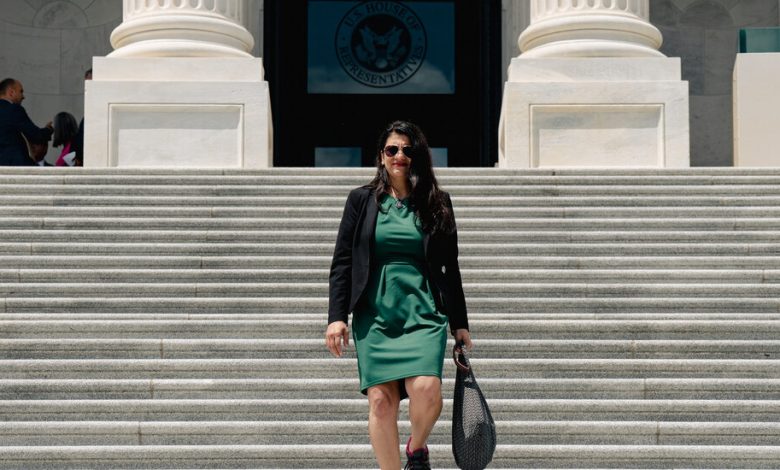Rashida Tlaib, Censured by the House, Is Praised and Condemned at Home

For more than a month, the suburbs of Detroit have played host to vigils where victims of the war between Israel and Hamas are commemorated with prayers, candles and tearful speeches.
But those vigils have told starkly differing stories about the war, and also about Rashida Tlaib, who represents the area and is the only Palestinian American in Congress.
At a gathering in solidarity with Israeli hostages last week at Adat Shalom synagogue, Jeremy Moss, a Democratic state senator from Southfield, a suburb with a large Jewish population in Ms. Tlaib’s district, spoke with concerned constituents. “I had so many people coming up to me saying that they don’t feel seen, heard, represented,” he said.
The following night, in the majority Arab American enclave of Dearborn, at a memorial for Palestinian casualties of the Israeli invasion of Gaza, speakers denounced the censure of Ms. Tlaib in Congress for her statements on the conflict.
Khalid Turaani, a Palestinian-American activist, compared Ms. Tlaib’s censure to that of Joshua Reed Giddings, a congressman and abolitionist who was censured by his House colleagues in 1842 for introducing resolutions opposing the slave trade.
“I guess history is repeating itself,” Mr. Turaani, who leads the Michigan Task Force for Palestine, told the crowd.
Since Hamas’ surprise attack on Israel on Oct. 7, no American politician save for President Biden has featured more centrally in arguments over the Israel-Hamas war than Ms. Tlaib. Since her election in 2018, the congresswoman, who has family living in the West Bank, has been the leading voice for Palestinian rights in Congress.
This year, thanks to a redistricting shake-up, she began representing one of the largest Arab American communities in the country, as well as parts of the largest Jewish community in the Detroit area. The war has put her in the increasingly difficult position of representing both constituencies, whose views of the conflict are both deeply personal and often extraordinarily difficult to reconcile.
Interviews in Ms. Tlaib’s district revealed a split-screen view of the war in Gaza and laid bare the grievances that have shaped it. It is a particularly acute version of the national debate over the conflict, rooted in family histories of the Holocaust and personal experiences of lost lives and land since the advent of Israeli statehood.
The divide would pose a formidable challenge for any politician. But for Ms. Tlaib, who has staked out a position that alienates many of those constituents, it could be unbridgeable.
After the Oct. 7 attack, in which Hamas attackers killed about 1,200 people and took about 240 hostages, Ms. Tlaib was one of 10 House members who voted against a resolution to condemn Hamas and reaffirm $3.3 billion a year in U.S. military assistance to Israel.
On Nov. 3, she posted a video on social media accusing President Biden of supporting the “genocide of the Palestinian people” and including footage of demonstrators chanting “from the river to the sea,” a pro-Palestinian slogan that many see as calling for not only the restoration of Palestinian land claims but also the eradication of Israel.
Ms. Tlaib has said she saw it as “an aspirational call for freedom, human rights and peaceful coexistence, not death, destruction or hate.” In a statement released shortly before the censure vote, she vowed to “continue to work for a just and lasting peace that upholds the human rights and dignity of all people, centers peaceful coexistence between Israelis and Palestinians, and ensures that no person, no child has to suffer or live in fear of violence.”
Ms. Tlaib’s defense of the slogan drew condemnation from the Biden administration, as well as criticism from Michigan’s attorney general, Dana Nessel, and disavowal from Gov. Gretchen Whitmer, both Democrats.
On Tuesday, 22 of Ms. Tlaib’s Democratic colleagues joined House Republicans in passing a resolution to censure her and accusing her of “calling for the destruction of the state of Israel.” Democratic Majority for Israel, a group led by the Democratic pollster Mark Mellman, is running television ads in the Detroit area criticizing Ms. Tlaib.
“I think Congresswoman Tlaib is radically out of step with her colleagues in Congress, radically out of step with the Democratic Party, and radically out of step with Democrats in Michigan,” Mr. Mellman said. “We hope she will change her views, and if not, perhaps somebody might be interested in running against her.”
Pro-Israel groups like Mr. Mellman’s have in recent elections spent millions targeting pro-Palestinian House candidates in Democratic primaries, though Ms. Tlaib has easily won her two re-election bids. But shifts in Michigan’s political geography have sharpened both support for and resentment of her foreign policy views among her constituents.
After the state’s redistricting commission redrew Michigan’s congressional map two years ago, Ms. Tlaib decided to shift from the state’s Detroit-centered 13th Congressional District to the neighboring 12th, which on the new map spans western Detroit and a dozen outlying suburbs.
The new 12th District — which, like the 13th, is overwhelmingly Democratic — includes many of the same constituents. It also includes communities that have been uniquely polarized by the war. In the southeastern corner of the district is Dearborn, a working-class city whose population of nearly 110,000 is over half Arab American. It has long been a hub for pro-Palestinian activism.
“We’re very angry here,” said Amer Zahr, a local lawyer and activist. “If Biden walked into Dearborn right now, he would be persona non grata.”
The district also encompasses several affluent communities in Oakland County, a sprawling suburban area north of Detroit that is home to most of the region’s Jewish population.
Two days after the Hamas attack, more than 2,000 people gathered at Congregation Shaarey Zedek, a prominent Conservative synagogue in Ms. Tlaib’s district, for a fund-raiser organized by the Jewish Federation of Metropolitan Detroit that raised $1.5 million for humanitarian aid to Israel. Ms. Whitmer and Ms. Nessel attended, as did Senator Gary Peters, and Representatives Haley Stevens and Shri Thanedar, who now represents Ms. Tlaib’s former district. Ms. Tlaib did not attend.
In an email, Aaron Starr, the congregation’s rabbi, said Ms. Tlaib “has chosen not to reach out, and she has responded to my efforts to communicate with her with misleading form letters.” He accused her of “siding with the terrorist organization Hamas.”
To her detractors, it was the first of many slights.
“I was hopeful that she was going to represent the whole district,” said Pamela Lippitt, a communications coach in Southfield, who is Jewish and active in pro-Israel causes. “But she just — she doesn’t represent me.”
Mr. Moss noted that even some of Ms. Tlaib’s most reliable congressional allies on Palestinian concerns, such as Alexandria Ocasio-Cortez and Ilhan Omar of Minnesota, clearly condemned Hamas quickly after the attack. Ms. Tlaib did not, though in an interview with the Detroit Free Press four days later she described the attack as “a war crime just like the collective punishment of Palestinians right now is a war crime.”
“I think what’s happening to children in Gaza is a travesty. Jewish pain doesn’t negate Palestinian pain,” Mr. Moss said. “But Jews are also in pain, and acknowledgment of that is what’s been missing.”
Since the start of the Israeli counterattack that according to the Gaza Health Ministry has killed over 10,000 people, more than 4,100 of them children, those with a personal stake on the other side of the conflict have levied the same complaint against Ms. Tlaib’s critics.
“People are losing focus about what’s important here,” said Emad Shehada, a Palestinian-American physician in West Bloomfield, who said that 20 members of his extended family had been killed in Gaza since the Israeli campaign began. “People are being killed. And the most important thing is to stop that.”
In Dearborn, Ms. Tlaib has been hailed as a hero by many of her constituents. “She’s sticking up for human rights,” said Abe Bachir, a 59-year-old mechanic.
To Mr. Bachir, who is Lebanese-American, Ms. Tlaib’s censure called attention to how little voice Arab Americans have in Congress.
“She’s the only Palestinian there, so it’s one-sided, you know?” he said. But “she’s got the backing of the world.”
Over the past decade, the cause of Palestinian rights and statehood has gained traction across the Democratic electorate’s left wing, and Mr. Turaani and other activists say they intend to wield the issue in the 2024 election against a party that they believe has broadly deserted them.
It has already jolted local Democratic politics. This month, planned appearances by Ms. Whitmer and Jocelyn Benson, the secretary of state, at events in the Detroit area were canceled shortly after Mr. Zahr and others organized demonstrations against them.
An Associated Press-NORC Center for Public Affairs Research poll conducted early this month found a majority of Democrats skeptical about the war in Gaza, with 58 percent saying they viewed Israel’s counterattack as excessive.
Neither Dearborn nor the Oakland County suburbs are demographically representative of Ms. Tlaib’s district, which is more than 43 percent Black and remains rooted in Detroit, with most household incomes below the national median and the second-highest poverty rate of any district in the state.
Ulysses Nash, a recently laid-off auto assembly line worker from Inkster, a suburb west of Detroit, said he was sympathetic to the Israelis in the conflict and did not support a cease-fire. But he also questioned the American funding for the war, when that money could be spent at home.
“I’m not saying it’s not important,” Mr. Nash said. Still, he said, “we need to send billions here to save our own people. People are on the streets right now.”



